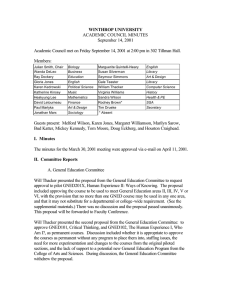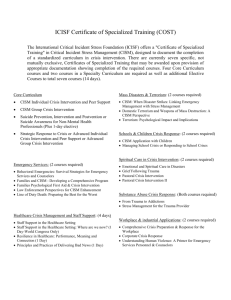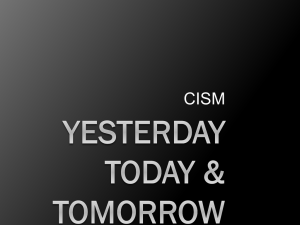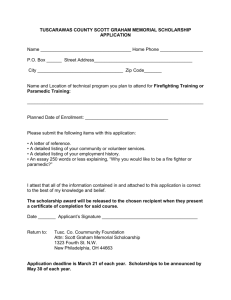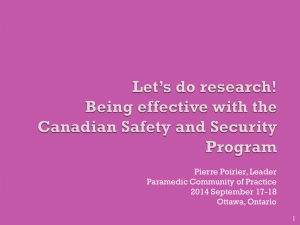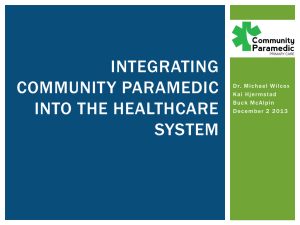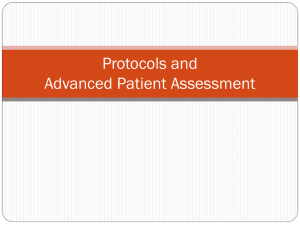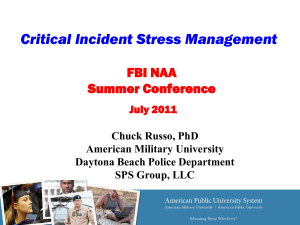Defusing-Pediatric Calls - Fire
advertisement
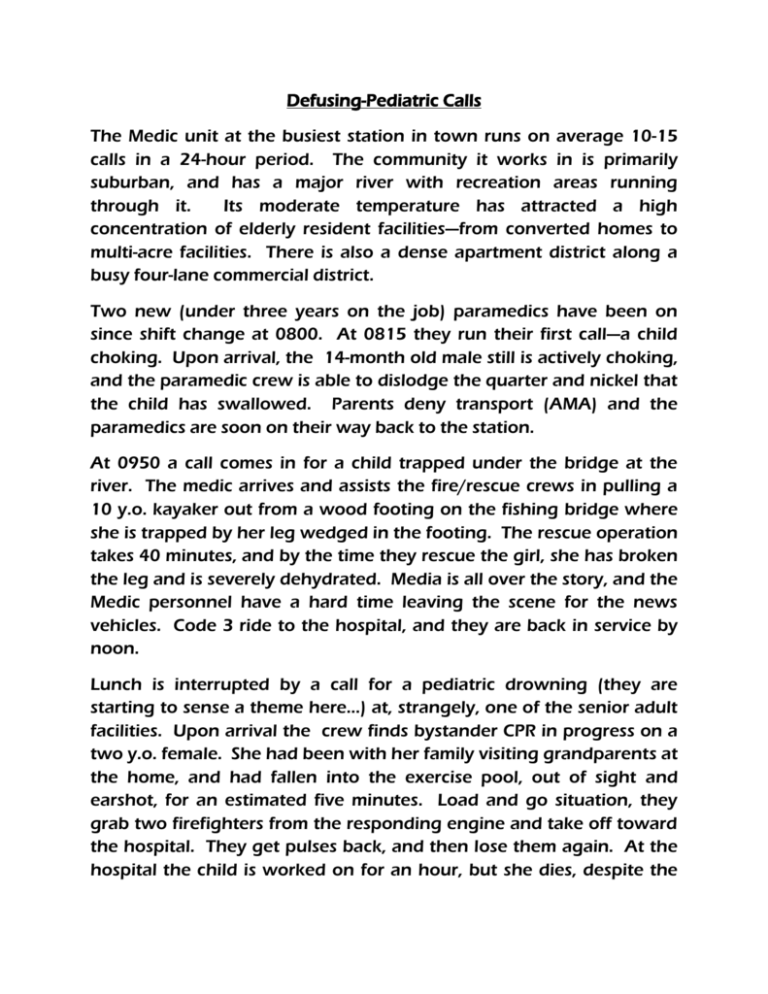
Defusing-Pediatric Calls The Medic unit at the busiest station in town runs on average 10-15 calls in a 24-hour period. The community it works in is primarily suburban, and has a major river with recreation areas running through it. Its moderate temperature has attracted a high concentration of elderly resident facilities—from converted homes to multi-acre facilities. There is also a dense apartment district along a busy four-lane commercial district. Two new (under three years on the job) paramedics have been on since shift change at 0800. At 0815 they run their first call—a child choking. Upon arrival, the 14-month old male still is actively choking, and the paramedic crew is able to dislodge the quarter and nickel that the child has swallowed. Parents deny transport (AMA) and the paramedics are soon on their way back to the station. At 0950 a call comes in for a child trapped under the bridge at the river. The medic arrives and assists the fire/rescue crews in pulling a 10 y.o. kayaker out from a wood footing on the fishing bridge where she is trapped by her leg wedged in the footing. The rescue operation takes 40 minutes, and by the time they rescue the girl, she has broken the leg and is severely dehydrated. Media is all over the story, and the Medic personnel have a hard time leaving the scene for the news vehicles. Code 3 ride to the hospital, and they are back in service by noon. Lunch is interrupted by a call for a pediatric drowning (they are starting to sense a theme here…) at, strangely, one of the senior adult facilities. Upon arrival the crew finds bystander CPR in progress on a two y.o. female. She had been with her family visiting grandparents at the home, and had fallen into the exercise pool, out of sight and earshot, for an estimated five minutes. Load and go situation, they grab two firefighters from the responding engine and take off toward the hospital. They get pulses back, and then lose them again. At the hospital the child is worked on for an hour, but she dies, despite the ER and paramedics valiant efforts. The Medic unit heads back to the station disheartened. Next call comes in at 1530 for a law enforcement assist, pediatric abuse. Crew arrives to find a four y.o. male, very dehydrated, visibly bruised about his torso and limbs, and with burns and open wounds also. The LE on scene have a couple in custody who were “babysitting” and had admittedly beaten and burned the child in order to get him to obey. Drug use is suspected. The Medics and engine crew of four are all evaluating the child, and the three police officers are clustered discussing procedures, and waiting for CSI, away from the patrol car holding the suspects, when the father arrives. He proceeds to take a baseball bat out of his vehicle and opens the door of the patrol car and starts beating the couple. The screams from the couple are heard by all, and the officers approach and tell the man to drop the bat. He refuses, and rushes the nearest officer, still holding the bat. The officer draws his weapon, shoots and fatally wounds the man. The paramedics assess him, call for additional two medics and single engine company for the battered couple and head to the hospital with the abused child. They are busy with reports and paperwork until 1900 hours. Upon return to the station, they inform dispatch that they need a Defusing for themselves and the engine company personnel that responded to the abuse call. This Defusing takes place at 2100 hours at a fire station with the EMS & Fire CISM Team. For this exercise you will need: *(optional special CISM role) Eight volunteers to role-play victims and four to five CISM team members (have them define positions). Conduct the Defusing. Anybody you’d “red flag” as needing further help? What were some of the “normal” reactions expressed? Was the CISM information delivered adequately? Key terms used? Anything to add? Paramedic Paramedic You have a three y.o. girl at home, and these calls remind you of her. Though you scored at the top of your paramedic class, you blanked on pediatric dosages on the CPR call and had to consult the protocols, eating up valuable “Golden Hour” time—you secretly feel that this is why the child died. Voice this if anyone asks if there was anything you would have done different. Deeply affected by fatigue, you state that you don’t know if you can last the rest of the shift, but don’t want to be classified as a “lightweight” who can’t handle the job. You have just gotten married a month ago, and are in the process of buying your first house with your spouse. This has you stressed with “life events”. You don’t normally work with this paramedic, and know that they have the reputation of being a “know-itall” and a hothead. When you questioned a dosage on the CPR call, the other medic yelled at you—you resolved to never work with that person again. The abuse call leaves you rattled—state you never want to have to see that kind of abuse, or a LE shooting ever again “for as long as I live”. You were the one that called for the Defusing, because in your academy you remember the awareness-level training said that anyone could activate the CISM team. You feel the fire crew may view this as a sign of weakness in character. Fire Captain Firefighter You are glad that someone called for a Defusing, because, as a past member of the CISM Team, this is a definite time for one. If the paramedic states their apprehensions about “pulling the CISM trigger”, commend that person. You are six months from retirement after 32 years in the fire service. State that in all your years on the job, you’ve never seen such a horrific scene as the abuse done on that child. You are stunned by the total disregard for the child by the couple, and are very angry at them. This has you thinking about going home for the remainder of the shift. As the senior firefighter at the department, you and the captain have worked the same company for the last 14 years together. You echo the sentiment of your captain that this is “the worst call” you’ve ever been on. Your child is the paramedic normally on the unit, but was off that day. State that you are glad they didn’t have to witness the abuse call events. You are initially very vocal, but progressively get quieter and a faraway gaze develops. If asked, say you are thinking of what would have happened if your child had been there. Dispatcher Firefighter You received all the calls that the medic unit were dispatched on this day. No one called you after the CPR or rescue call, so you had to call around to the hospitals and fire stations to find out the outcome of those calls. You’re not too happy about the lack of communication from this medic crew, and you voice this to them. After listening to their recounts of the abuse call you apologize and ask if there is anything you can do to help them. You share that you are frustrated with your job, thinking of quitting and moving to Alaska. You end up at the end of the defusing saying that this was worth attending. You are not sure what this CISM stuff is all about, and ask if it is mandatory that you attend/participate. State that you are “fine” and don’t need “fixing”. As you listen to the recounts of the abuse call, you have an attitude of “ain’t no big deal” and keep saying that this is all part of the job—get over it! Start recounting past calls where you felt sad/mad and how you just “got back on the horse” and did the job. Make this your aim—to show others how you toughened yourself to the job. Tell LOTS of stories…the CISM team should tell you to focus on today’s events, but you have a lot of emotional baggage. OK to break down after a while. Special CISM Role Fire Engineer All these pediatric calls start bringing back memories of things in your past that you thought you had dealt with, but now are surfacing. You start out sharing the CISM procedure, but gradually get quieter and then abruptly leave the Defusing (make a obvious show of this). If someone from the CISM team follows, tell them you are not returning to the Defusing, but that you are seeking further help from MHP. Tell them to return to the group. You can now observe… As a new engineer, you are constantly trying to prove yourself as a “team player”. Ask for constant confirmation that what you did (state examples— driving fast enough, getting the right equipment, denying access to scene, etc.) on the abuse call was the “right thing” to do. When asked how the event affected you, share how you avoided any contact with the child to prevent yourself from any of the “bad visuals”, and after the fatal shooting you avoided touching the victim because of all the blood. You are in paramedic school currently, but you’re second guessing that career choice.
